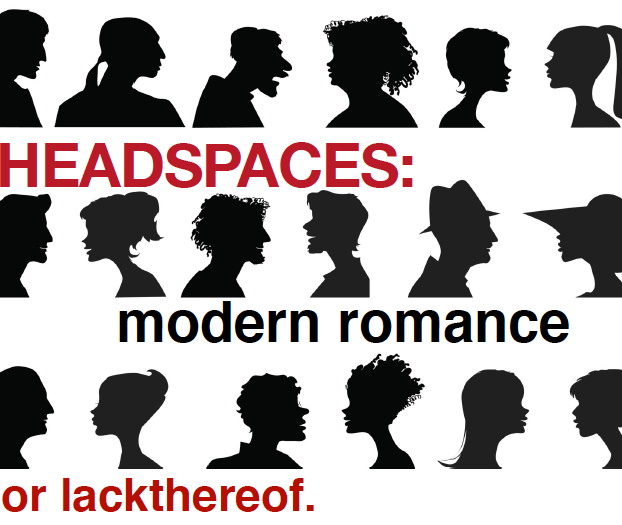
HeadSpaces is a brand new column featuring the clever minds of psychologists Dr. Rachel Kozlowski and Dr. Naomi Ben-Ami discussing modern romance.
Dear HeadSpaces Docs,
I have been called a ‘serial dater’ in the past. And truthfully, I tend to go from relationship to relationship. The truth is, I really just don't like to be by myself. But is that really such a bad thing? What gives? Can you help? I'm so confused!
Dear Serial Dater,
These are some heavy, complicated questions my friend, no wonder you're feeling like a kid who just left the tilt-a-whirl. But let's try and parse out some of these feelings and intentions.
First things first. Being alone—physically or without a romantic relationship—doesn’t have to be synonymous with being lonely. Loneliness and aloneness are, in fact, very different things. Being alone is simply the straight-up act of spending time with oneself (be it knitting, masturbating, running, bobbing or weaving) while being lonely refers to feeling sadness or anxiety related to the real-deal absence of another person. Or the perhaps even worse feeling—because it doesn't necessarily "make sense"—of feeling the absence of others despite having people around.
Take a moment—or a shower-long stew—to really think about which one you're experiencing. Peer inside your brain and guts and try to see if your "excessive dating" might be a strategy you’re using (consciously or otherwise) to avoid feelings you may have to face when you’re solo.
What might you be avoiding by moving from relationship to relationship?
Might I offer this insight from Los Doctors:
"It seems as though along with avoiding sitting with yourself in a more serious way, you may be avoiding intimacy with others, as well. By moving from person to person you have the company you seem to yearn for, but risk having more superficial relationships if you’re not connecting with your partner in a more penetrating way."
Also—and this may sound all touchy-feely, get your Cat Stevens on by the fire—but by spending all your time with others, you could very well be doing yourself a disservice when it comes to your relationship with the big, shadowy Y-O-U.
"Human beings are social animals, and our sense of self is largely shaped by the relationships we have with others. So that means it is quite natural to long to feel wanted and loved by those around us. But there is a difference between that universal human wish to be liked and being wholly dependent on validation from others to feel okay about yourself. In other words, the ultimate source of what makes you feel good about you matters. It’s important to have internal sources for your confidence and self-worth."
It's very possible that someone, ahem, who is participating in the bountiful blur of serial dating, is actually participating in a pattern which directly derives self-esteem and validation from amorous accolades they receive from a partner. I.e., once the left side of the bed is cold . . . one could find themselves feeling insecure and empty.
"An over reliance on external validation often plays a major role in dating and self-esteem issues. Ask yourself whether you tend to overly rely on validation from others; if so, it’s likely you feel dependent on the approval of others to generate your own self-worth."
Basically? Learning to be alone helps develop your relationship with yourself—self-love is a real actual thing you guys—and ultimately with others.
Here are some important ingredients for you to hone some good old fashioned alone time—and enjoy it.
1. Be nice to yourself! Do things that make you feel good, from hot yoga to a pint of pistachio ice cream. Using your alone time effectively (catching up on emails, giving your eccentric aunt a call back or finally doing that ever-creeping pile of laundry) may help you feel productive and more positive, but . . . "allow yourself" a break if you just want to binge-watch Paul Newman movies too.
2. Challenging your perspective. Spending time on your own can be rewarding (see suggestion #1) and is critical to self-development and growth. Simply put, how can you get a sense of your true desires if you’re always considering and reacting to others? Give yourself some time to assess exactly what you'd like/need/want to be doing, saying or working on, utterly un-dictated by other people's actions or desires.
3. Discover new passions. Try something new you’ve always wanted to—cheese-making! mountain-biking! tap dance!—but never had the time or focus or attention-span to actually pursue. Hobbies are often the first thing to fall by the wayside like so much road-kill when you’re in a new relationship, so open yourself up to having new experiences on your own.
4. Nurture other relationships. Whether you’re dating or not, friends and family are critical sources of companionship and support. Of ranting and re-calibration. Of story and scandal sharing. Cultivate these dynamic relationships, but not at the expense of your alone time!
5. Self compassion is key. It may sound silly, but sometimes we're the cruelest critical element in our own lives. Be as nice to yourself as you would be to your best friend. Learning to say, Damn, you did good today is a crucial component of developing an internal source of validation.
And as always, the Good Doctors remind us that you very well may want to seek out therapy to help you sort out and suss through your brain-stew; sitting alone and getting to know yourself could be more painful and scary than you think.
But totally worth it.







